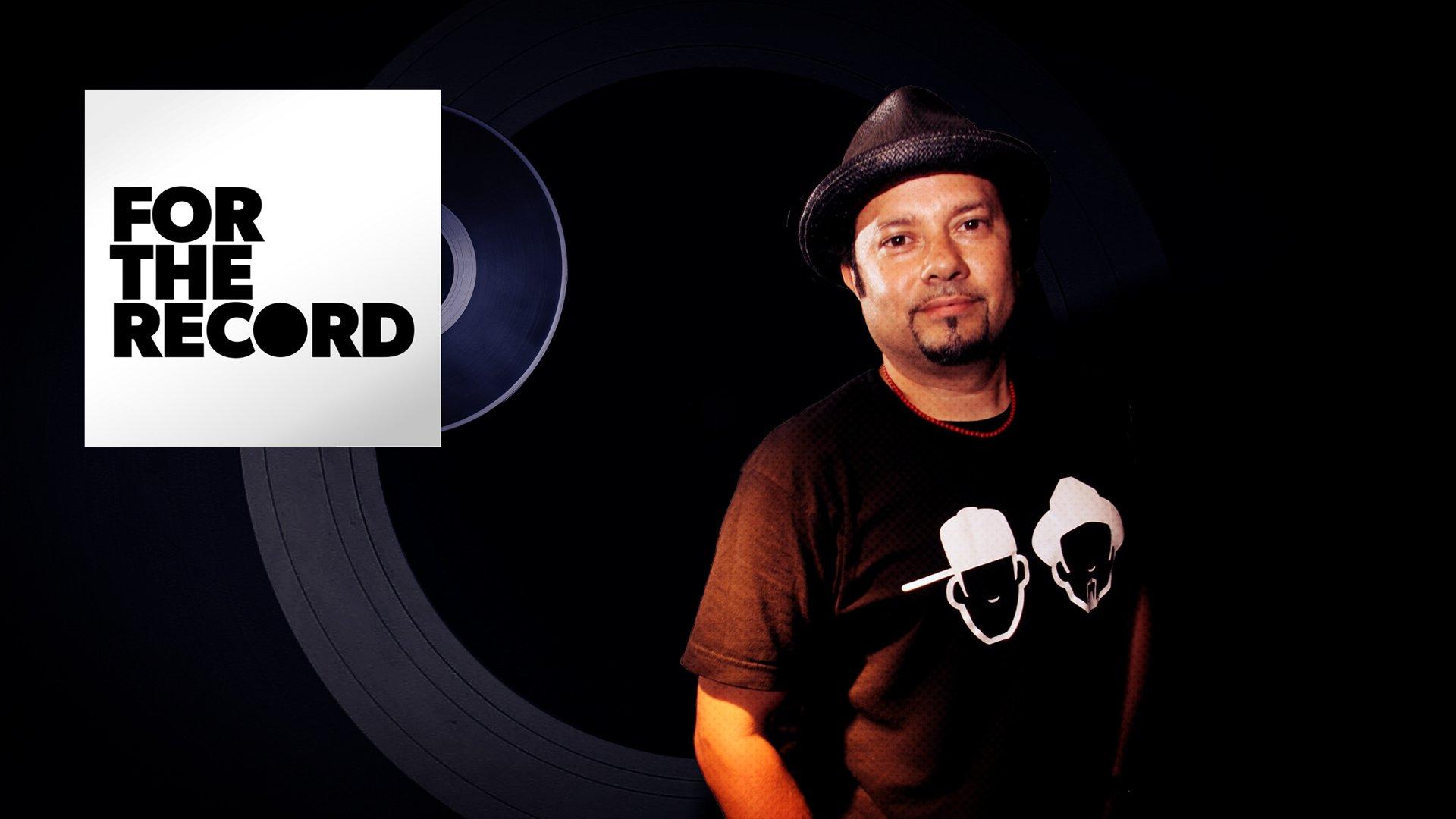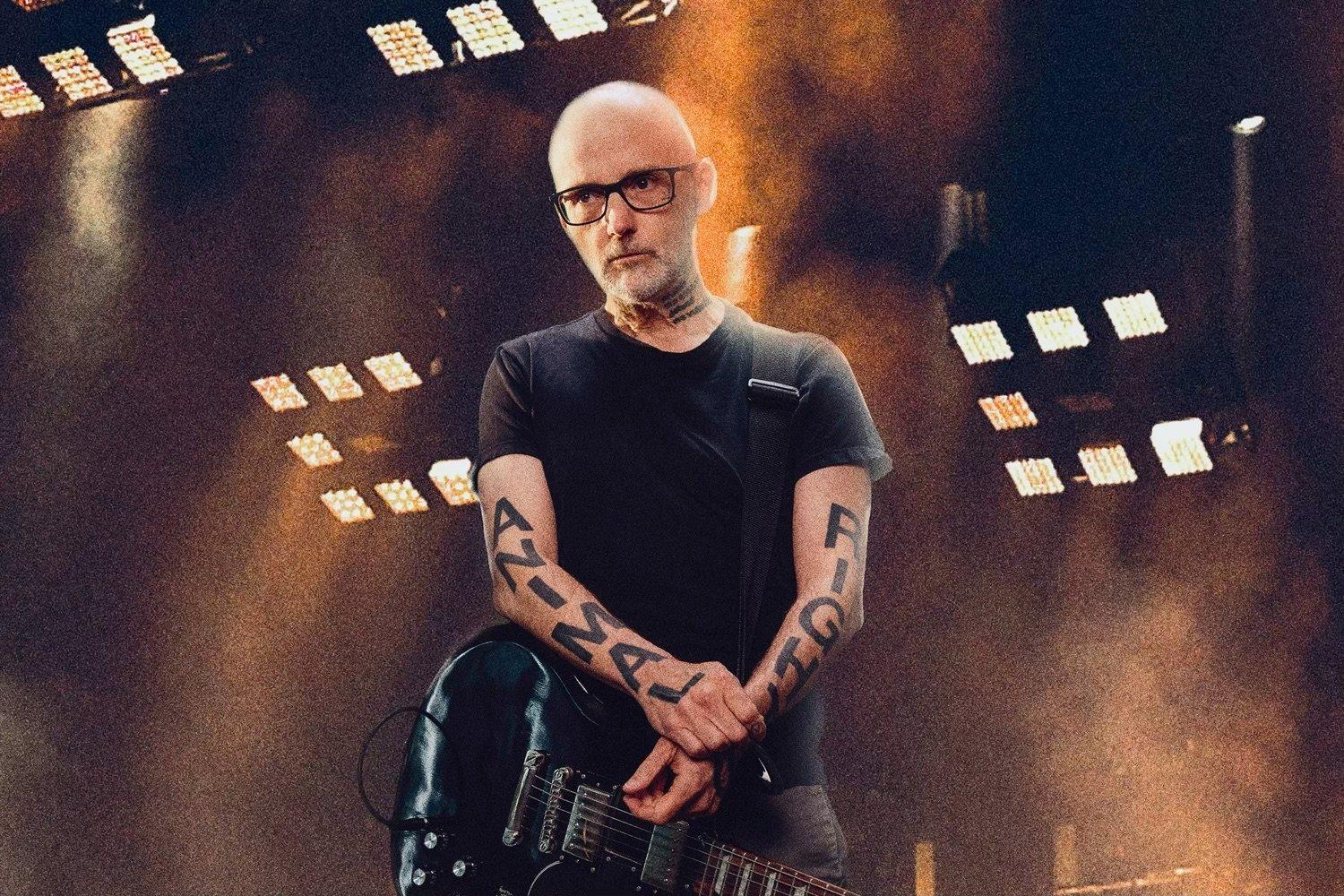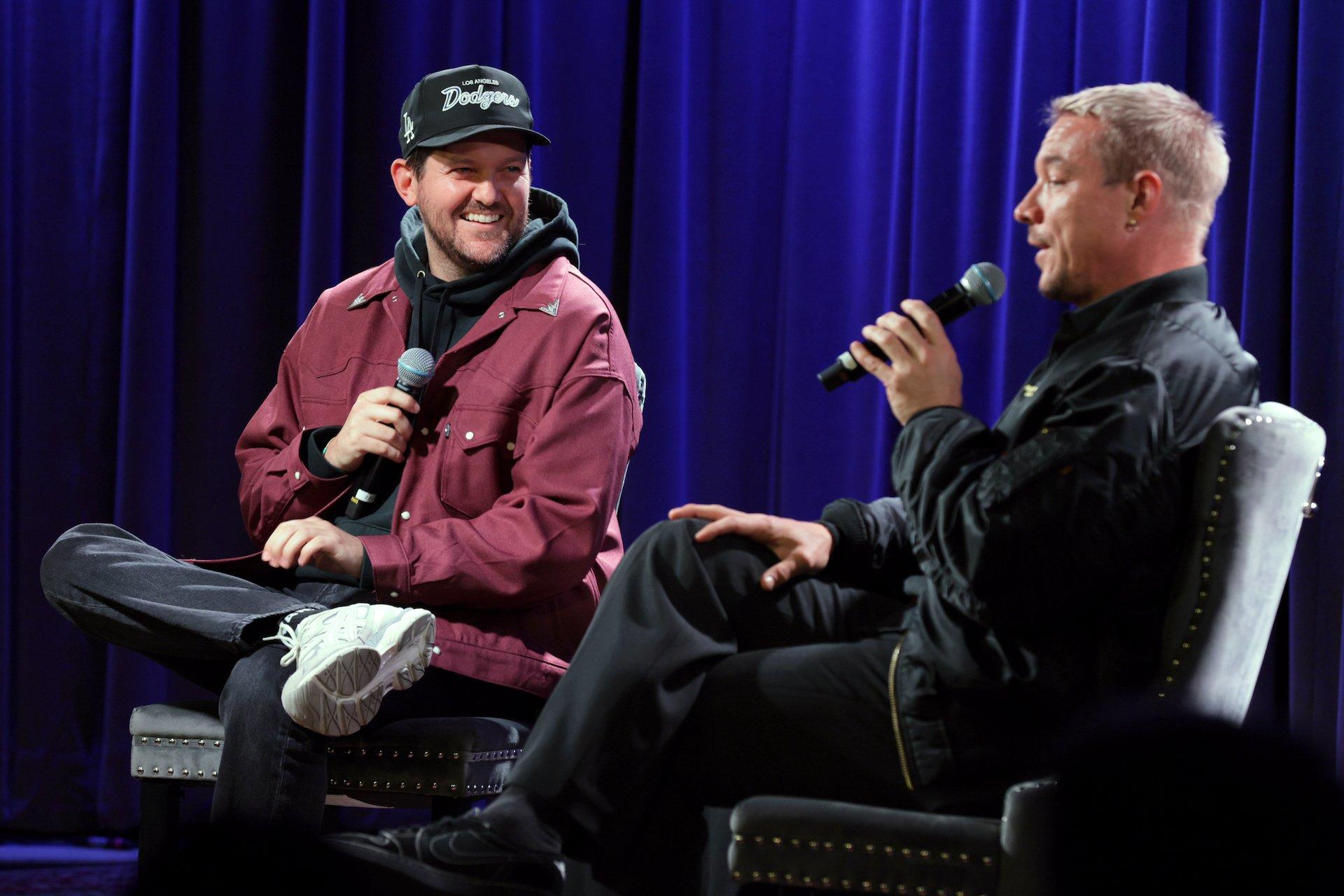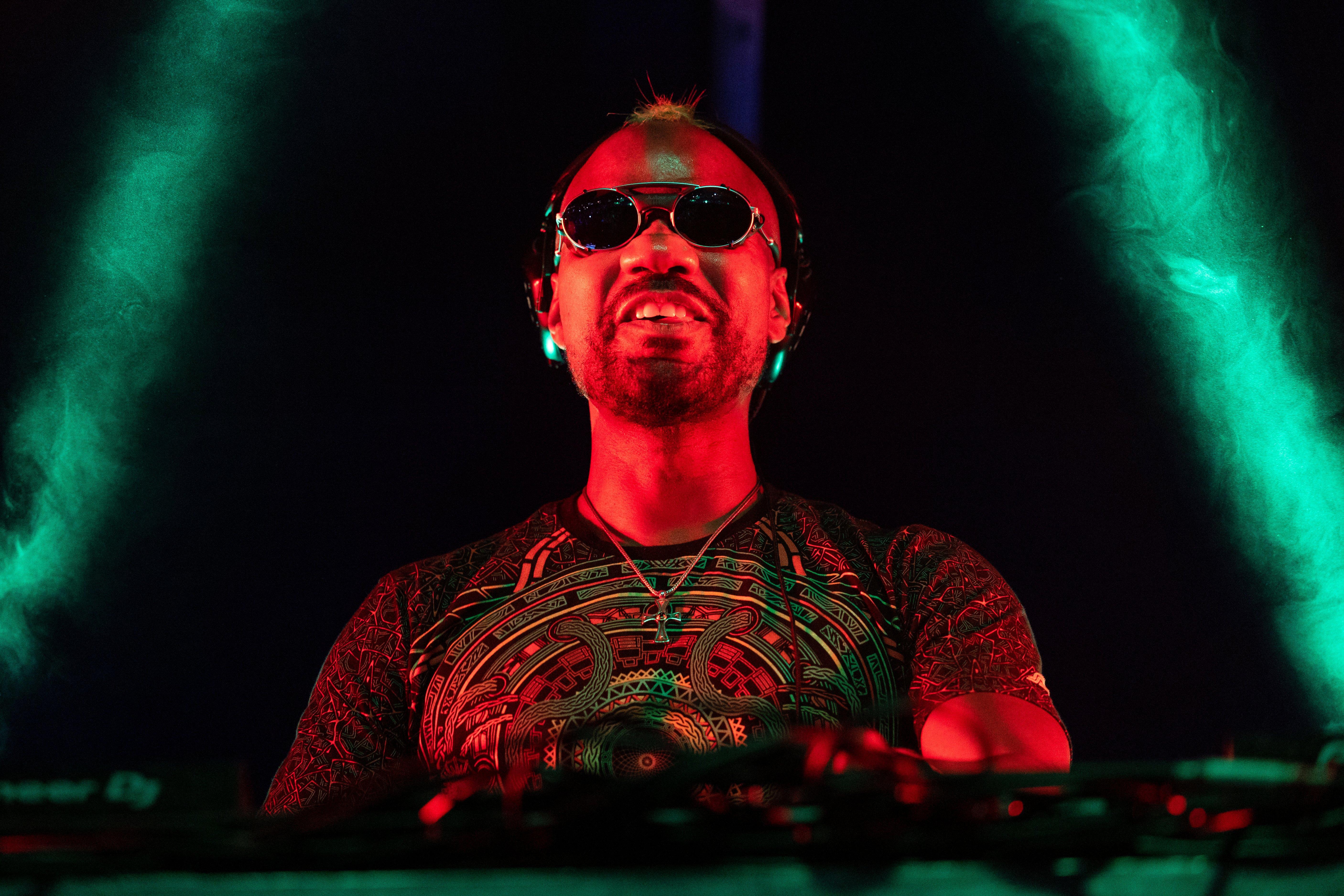Photo: PYMCA/Universal Images Group via Getty Images

Louie Vega
news
For The Record: Explore The Decades-Long Career Of Legendary Producer "Little" Louie Vega
In the latest episode of For The Record, GRAMMY.com examines the legendary career of GRAMMY-winning producer, DJ and remixer "Little" Louie Vega
Simply put, Louie Vega is a living legend behind the turntables.
Vega received his first GRAMMY nomination, for Remixer of the Year, Non-Classical, at the 41st GRAMMY Awards in 1999; he received his most recent GRAMMY nomination, for Best Remixed Recording, at the 63rd GRAMMY Awards in 2021.
To put Vega's iconic music career into perspective, the producer/DJ/remixer has been getting nominated for GRAMMYs for as long as the euro has been accepted as currency.
After starting his career in the '80s and gaining widespread success in the nightlife arena, Vega, commonly referred to as "Little" Louie Vega, became an even bigger artist in the '90s, thanks to collaborations with a diverse group of superstars like Curtis Mayfield, Luther Vandross, Madonna, and Janet Jackson.
Watch the clip above to find out how Vega, always destined for musical greatness, burst onto the scene in the '80s and continues to dominate dance floors worldwide decades later.
Click below to dig through the crates of For The Record and find out how some of the biggest names in music made their climb.
Seth Troxler On His Detroit DJ Education & The Rich Black History—& Future—Of Dance Music

Photo: Mike Formanski
interview
"Let Yourself Be Idiosyncratic": Moby Talks New Album 'Always Centered At Night' & 25 Years Of 'Play'
"We're not writing for a pop audience, we don't need to dumb it down," Moby says of creating his new record. In an interview, the multiple-GRAMMY nominee reflects on his latest album and how it contrasts with his legendary release from 1999.
Moby’s past and present are converging in a serendipitous way. The multiple-GRAMMY nominee is celebrating the 25th anniversary of his seminal work, Play, the best-selling electronic dance music album of all time, and the release of his latest album, always centered at night.
Where Play was a solitary creation experience for Moby, always centered at night is wholly collaborative. Recognizable names on the album are Lady Blackbird on the blues-drenched "dark days" and serpentwithfeet on the emotive "on air." But always centered at night’s features are mainly lesser-known artists, such as the late Benjamin Zephaniah on the liquid jungle sounds of "where is your pride?" and Choklate on the slow grooves of "sweet moon."
Moby’s music proves to have staying power: His early ‘90s dance hits "Go" and "Next is the E" still rip up dancefloors; the songs on Play are met with instant emotional reactions from millennials who heard them growing up. Moby is even experiencing a resurgence of sorts with Gen Z. In 2023, Australian drum ‘n’ bass DJ/producer Luude and UK vocalist Issey Cross reimagined Moby’s classic "Porcelain" into "Oh My." Earlier this year, Moby released "You and Me" with Italian DJ/producer Anfisa Letyago.
Music is just one of Moby’s many creative ventures. He wrote and directed Punk Rock Vegan Movie as well as writing and starring in his homemade documentary, Moby Doc. The two films are produced by his production company, Little Walnut, which also makes music videos, shorts and the podcast "Moby Pod." Moby and co-host Lindsay Hicks have an eclectic array of guests, from actor Joe Manganiello to Ed Begley, Jr., Steve-O and Hunter Biden. The podcast interviews have led to "some of the most meaningful interpersonal experiences," Moby tells GRAMMY.com.
A upcoming episode of "Moby Pod" dedicated to Play was taped live over two evenings at Los Angeles’ Masonic Lodge at Hollywood Forever Cemetery. The episode focuses on Moby recounting his singular experiences around the unexpected success of that album — particularly considering the abject failure of his previous album, Animal Rights. The narrative was broken up by acoustic performances of songs from Play, as well as material from Always Centered at Night (which arrives June 14) with special guest Lady Blackbird. Prior to the taping, Moby spoke to GRAMMY.com about both albums.
'Always centered at night' started as a label imprint then became the title of your latest album. How did that happen?
I realized pretty quickly that I just wanted to make music and not necessarily worry about being a label boss. Why make more busy work for myself?
The first few songs were this pandemic process of going to SoundCloud, Spotify, YouTube and asking people for recommendations to find voices that I wasn’t familiar with, and then figuring out how to get in touch with them. The vast majority of the time, they would take the music I sent them and write something phenomenal.
That's the most interesting part of working with singers you've never met: You don't know what you're going to get. My only guidance was: Let yourself be creative, let yourself be idiosyncratic, let the lyrics be poetic. We're not writing for a pop audience, we don't need to dumb it down. Although, apparently Lady Blackbird is one of Taylor Swift's favorite singers.
Guiding the collaborators away from pop music is an unusual directive, although perhaps not for you?
What is both sad and interesting is pop has come to dominate the musical landscape to such an extent that it seems a lot of musicians don't know they're allowed to do anything else. Some younger people have grown up with nothing but pop music. Danaé Wellington, who sings "Wild Flame," her first pass of lyrics were pop. I went back to her and said, "Please be yourself, be poetic." And she said, "Well, that’s interesting because I’m the poet laureate of Manchester." So getting her to disregard pop lyrics and write something much more personal and idiosyncratic was actually easy and really special.
You certainly weren’t going in the pop direction when making 'Play,' but it ended up being an extremely popular album. Did you have a feeling it was going to blow up the way it did?
I have a funny story. I had a date in January 1999 in New York. We went out drinking and I had just gotten back the mastered version of Play. We're back at my apartment, and before our date became "grown up," we listened to the record from start to finish. She actually liked it. And I thought, Huh, that's interesting. I didn't think anyone was going to like this record.
You didn’t feel anything different during the making of 'Play?'
I knew to the core of my being that Play was going to be a complete, abject failure. There was no doubt in my mind whatsoever. It was going to be my last record and it was going to fail. That was the time of people going into studios and spending half a million dollars. It was Backstreet Boys and Limp Bizkit and NSYNC; big major label records that were flawlessly produced. Play was made literally in my bedroom.
I slept under the stairs like Harry Potter in my loft on Mott Street. I had one bedroom and that's where I made the record on the cheapest of cheap equipment held up literally on milk crates. Two of the songs were recorded to cassette, that's how cheap the record was. It was this weird record made by a has-been, a footnote from the early rave days. There was no world where I thought it was going to be even slightly successful. Daniel Miller from Mute said — and I remember this very clearly — "I think this record might sell over 50,000 copies." And I said, "That’s kind of you to say but let's admit that this is going to be a failure. Thank you for releasing my last record."
Was your approach in making 'Play' different from other albums?
The record I had made before Play, Animal Rights, was this weird, noisy metal punk industrial record that almost everybody hated. I remember this moment so vividly: I was playing Glastonbury in 1998 and it was one of those miserable Glastonbury years. When it's good, it's paradise; it's really special. But the first time I played, it was disgusting, truly. A foot and a half of mud everywhere, incessant rain and cold. I was telling my manager that I wanted to make another punk rock metal record. And he said the most gentle thing, "I know you enjoy making punk rock and metal. People really enjoy when you make electronic music."
The way he said it, he wasn't saying, "You would help your career by making electronic music." He simply said, "People enjoy it." If I had been my manager, I would have said, "You're a f—ing idiot. Everyone hated that record. What sort of mental illness and masochism is compelling you to do it again?" Like Freud said, the definition of mental illness is doing the same thing and expecting different results. But his response was very emotional and gentle and sweet, and that got through to me. I had this moment where I realized, I can make music that potentially people will enjoy that will make them happy. Why not pursue that?
That was what made me not spend my time in ‘98 making an album inspired by Sepultura and Pantera and instead make something more melodic and electronic.
After years of swearing off touring, what’s making you hit stages this summer?
I love playing live music. If you asked me to come over and play Neil Young songs in your backyard, I would say yes happily, in a second. But going on tour, the hotels and airports and everything, I really dislike it.
My manager tricked me. He found strategically the only way to get me to go on tour was to give the money to animal rights charities. My philanthropic Achilles heel. The only thing that would get me to go on tour. It's a brief tour of Europe, pretty big venues, which is interesting for an old guy, but when the tour ends, I will have less money than when the tour begins.
Your DJ sets are great fun. Would you consider doing DJ dates locally?
Every now and then I’ll do something. But there’s two problems. As I've become very old and very sober, I go to sleep at 9 p.m. This young guy I was helping who was newly sober, he's a DJ. He was doing a DJ set in L.A. and he said, "You should come down. There's this cool underground scene." I said, "Great! What time are you playing?" And he said "I’m going on at 1 a.m." By that point I've been asleep for almost five hours.
I got invited to a dinner party recently that started at 8 p.m. and I was like, "What are you on? Cocaine in Ibiza? You're having dinner at 8 p.m. What craziness is that? That’s when you're putting on your soft clothes and watching a '30 Rock' rerun before bed. That's not going out time." And the other thing is, unfortunately, like a lot of middle aged or elderly musicians, I have a little bit of tinnitus so I have to be very cautious around loud music.
Are you going to write a third memoir at any point?
Only when I figure out something to write. It's definitely not going to be anecdotes about sobriety because my anecdotes are: woke up at 5 a.m., had a smoothie, read The New York Times, lamented the fact that people are voting for Trump, went for a hike, worked on music, played with Bagel the dog, worked on music some more went to sleep, good night. It would be so repetitive and boring.
It has to be something about lived experience and wisdom. But I don't know if I've necessarily gotten to the point where I have good enough lived experience and wisdom to share with anyone. Maybe if I get to that point, I'll probably be wrong, but nonetheless, that would warrant maybe writing another book.
Machinedrum's New Album '3FOR82' Taps Into The Spirit Of His Younger Years

Photo: Courtesy of the Recording Academy™️/photo by Rebecca Sapp, Getty Images
list
Dillon Francis & Diplo In Conversation: 5 Things We Learned From The GRAMMY Museum Event
In honor of Dillon Francis' breakthrough hit "Get Low" turning 10 this year, the DJ/producer sat down with one of his longtime dance buds, Diplo, at the GRAMMY Museum. Check out five revelations from the career-spanning (and highly entertaining) chat.
Dillon Francis and Diplo have respectively built massive careers within dance music — but as they proved on May 15, they may have been just as successful doing stand-up comedy.
The two producers came together at the GRAMMY Museum's Clive Davis Theater for a wisecracking exchange, marking the 10-year anniversary of Francis' breakthrough song with DJ Snake, the platinum-certified "Get Low." It also felt like a celebration of
their longstanding friendship — which predates "Get Low" — as the conversation was filled with humorous anecdotes, insider stories about key moments in Francis' career, and some of Francis' favorite memories with Diplo.
Since "Get Low," Francis has had a mercurial music trajectory. Though he's released three studio albums and a number of EPs, his landmark mixtapes — 2015's This Mixtape Is Fire and last year's This Mixtape is Fire TOO — are the key highlights. Like many dance acts, collaboration has been at the core of Francis' work, particularly within the electronic community; he's teamed up with the likes of Skrillex, Calvin Harris, Martin Garrix, Kygo, Alison Wonderland, Illenium, Alesso, and even Diplo's trio Major Lazer.
More recently, Francis has released collaborations with Ship Wrek, Space Rangers and Sophie Powers, and the moombahton Pero Like EP with Good Times Ahead. The EP includes the bouncy "LA On Acid," whose video — which premiered at the South By Southwest Festival in March — features Diplo in its opening sequencing, along with cameos from Euphoria's Chloe Cherry, Righteous Gemstones' Tony Cavalero and Master of None's Eric Wareheim.
Three days after stopping by the GRAMMY Museum, Francis headed out to Las Vegas to perform at North America's largest electronic dance music festival, Electric Daisy Carnival, on May 18. It was one of many festival appearances for Francis this summer, along with one of several trips to Las Vegas, as he has a residency at the Wynn's XS Nightclub.
Below, take a look at five takeaways from Francis' spirited conversation with Diplo at the GRAMMY Museum.
Francis Met Diplo By Sliding Into His Twitter DMs
The two met in person 16 years ago in Francis' hometown of Los Angeles. Before that, Francis would send Diplo demos for consideration for the latter's record label, Mad Decent. Once Francis realized Diplo had heard his song "Masta Blasta," he slid into Diplo's Twitter DMs — and never left. "I was harassing him so much," Francis quipped. "'Let's please hang out right now. God, please let me come and hang out.'"
Diplo invited him to a bar, and they watched the Phillies (Diplo's team) lose. "It was one of my first blind dates," Diplo said. "I tried to make [Dillon] my ghost producer."
Shortly after their first meeting, the pair worked together on a dubstep remix for Kelly Rowland's "Motivation" — and the more exposure he had to Francis' production skills, the more convinced Diplo was of his talent. "[Dillon is] too good to be my ghost producer. He's already better than me. We got to do a real record with this guy."
Francis' Superior Social Media Skills Began As A Class Assignment In High School
Francis' comedic online presence is the perfect combination of humor and authenticity, adding another layer to his appeal alongside his music. He traced his savvy skills back to his time at Los Angeles County High School for the Arts and a new genres course he took. His teacher considered everything as art, and their creations could be whatever they wanted.
"My friend and I would make comedy videos, basic sketch shows, and we passed the class with flying colors," Francis recalled. "When Vine came around, I did what I did in that class. It was another way of doing stuff I love to do, which is making people laugh."
Diplo then chimed in with a hilariously fitting observation. "You are the Weird Al Yankovic of electronic music," he said. "You had bangers, but you made them funny and you made them accessible to people."
He also commended Francis for opening his eyes to what social media can do for a creator. "You put me onto interaction on social media in different ways," Diplo added. "I don't think any other electronic music DJs were putting their personality out there like you did. You were the first one to do that properly."
Francis' Musical Education Came From Collaboration
As Francis revealed, he dropped out of college after a semester. But as someone who has built his career on collaboration, he's learned everything he needs to know by working with other artists. In fact, he thinks of working with other producers as interning.
"It's my favorite thing to do," he said. "They're going to learn the way that you produce, you're going learn the way they produce. You can cross-pollinate your ideas and come away with new ways to make music. I feel like it also helps with evolving as an artist."
Diplo agreed, noting that Francis' time as a young producer, interning at studios, learning from producers and gaining relationships in the process was essential to his career. "Not to encourage more people to drop out of college," he joked.
Furious 7 Was A Key Player In The Success Of "Get Low"
Diplo pointed out that "Get Low" had its crossover moment after being included in the soundtrack for Furious 7, the 2015 installment of the Fast and Furious franchise. He asserted that it is special for a producer to have a song in a big movie, as he experienced with M.I.A.'s "Paper Planes" (which he co-wrote and co-produced) after it was featured in 2008's Pineapple Express.
As Francis recalled, "Get Low" was already well-received and being played by the DJ community, with about five million plays on Spotify before Furious 7. But once it was part of Furious 7 — first in the trailer and then in the film — it ramped up significantly (and now has more than 200 million Spotify streams as of press time).
"This is when people were buying music on iTunes," Francis remembers. "From the trailer, it peaked at number 5 or something like that, which is huge for any artist in dance music. We're not usually on that chart. To be right next to Selena Gomez with a song that says, 'Get low when the whistle goes,' is crazy."
He Had A Life-Altering Turning Point At 18
After Diplo concluded his questions, Francis took a few from the audience. In response to one fan about what he would have done differently early in his career, Francis opened up about one of the worst moments in his life — which actually turned into a great learning experience.
As he explained, at the age of 18, Francis was charged with a DUI (which was eventually downgraded to wet reckless). His parents spent their savings on a lawyer; he lost his car; he lost his license for a year; he did the DUI classes. And all of it put things into perspective.
"That was the first moment where I realized, things can get messed up and lost," he said. "I was like, 'I need to figure out my career. I'm going to go make money and I'm going to pay [my parents] back.' That was a very big driving factor for me."
Now 36, Francis views the incident as one of the best things to ever happen to him — and, in turn, for his path in dance music. "If that didn't happen, I don't think I would be sitting here on the stage today."
8 Essential Latin Electronic Releases: Songs And Albums From Bizarrap, Arca & More

Photo: Eric Ross
video
Global Spin: Watch VASSY Search For The “Off Switch” In This Acoustic Performance Of Her New Single
Australian dance pop singer VASSY offers an acoustic take on her EDM-influenced single, “Off Switch.”
In her latest track "Off Switch," Australian dance-pop artist VASSY captures the exhilarating intensity of a budding romance. She loves the rush but, at the same time, wishes she could fight the feeling, even if only for a few seconds.
"There's something electric between you and I/ The way we connected I can't describe/ We're right on the edge of blurring the lines/ Don't know why I'm scared of this rush inside," she sings in the intro. "I wish my heart, it had an off switch/ 'Cause, boy, I don't know how to stop this."
In this episode of Global Spin, watch VASSY deliver an acoustic performance of her track, playing guitar and using a pair of castanets for added rhythm.
VASSY released "Off Switch" on Jan. 5 with an electrifying music video swirling with vibrant neon lights.
Recently she wrapped a string of appearances supporting Aqua's United States leg of their world tour and earlier this month, performed a headlining show in San Diego. On May 18, she will take the stage at the BASSINTHEGRASS music festival in Darwin, Australia.
Press play on the video above to watch VASSY's lively performance of "Off Switch," and remember to check back to GRAMMY.com for more new episodes of Global Spin.
2024 GRAMMYs: Kylie Minogue Wins First-Ever GRAMMY For Best Pop Dance Recording For "Padam Padam"

Photo: Matt Jelonek/WireImage
interview
Dance Legend Curtis Jones On Cajmere, Green Velvet & 30 Years Of Cajual Records
As Green Velvet and Cajmere, DJ/producer Curtis Jones celebrates everything from Chicago to acid house. With a new party and revived record label, Jones says he wants to "shine a light on those who sacrificed so much to keep house music alive."
Curtis Jones is a dance music legend, whose multiple monikers only begin to demonstrate his deep and varied influence in the genre.
Jones has been active as a producer and DJ for decades, and is among a cadre of dance music acts forging a connection between the genre's origins and its modern iterations. Crucially, he joined Chicago house legends Honey Dijon and Terry Hunter on Beyoncé's house-infused RENAISSANCE, providing a sample for "Cozy." He’s also produced tracks with house favorites Chris Lake and Oliver Heldens, and DJed with Dom Dolla and John Summit.
Jones contributed to the aforementioned collaborations, young and old, as Green Velvet. He’s been releasing dance hits like "Flash" and "Answering Machine" under that name since the mid- '90s. He is also currently a staple of the live circuit, his signature green mohawk vibing in clubs and festivals around the globe — including at his own La La Land parties in Los Angeles, Denver, Orlando, and elsewhere.
Green Velvet is appropriately braggadocious, even releasing the popular "Bigger Than Prince" in 2013. But by the time Jones had released the heavy-grooving tech house track, his artistry had been percolating for decades as Cajmere.
Where Green Velvet releases lean into acid house and Detroit techno, Cajmere is all about the traditional house sound of Jones’ hometown of Chicago. When Jones first debuted Cajmere in 1991, Chicago’s now-historic reputation for house music was still developing. Decades after the original release, Cajmere tracks like "Percolator,” have sustained the Windy City sound via remixes by prominent house artists like Will Clarke, Jamie Jones, and Claude VonStroke.
"I love doing music under both of my aliases, so it’s great when fans discover the truth,” Jones tells GRAMMY.com over email. Often, Jones performs as Cajmere to open his La La Land parties, and closes as Green Velvet.
But beyond a few scattered performances and new tracks, Cajmere has remained dormant while Green Velvet became a worldwide headliner, topping bills in Mexico City, Toronto, Bogotá and other international dance destinations. He’s only shared two original releases as Cajmere since 2016: "Baby Talk,” and "Love Foundation,” a co-production with fellow veteran Chicago producer/DJ Gene Farris.
This year, Jones is reviving Cajmere to headliner status with his new live event series, Legends. First held in March in Miami, Jones' Legends aims to highlight other dance music legends, from Detroit techno pioneers Stacey Pullen and Carl Craig, to Chicago house maven Marshall Jefferson.
"My intention is to shine a light on those who sacrificed so much to keep house music alive," Jones writes. "The sad reality is that most of the legendary artists aren’t celebrated or compensated as well as they should be."
Given that dance music came into the popular music zeitgeist relatively recently, the originators of the genre — like the artists Jones booked for his Legends party — are still in their prime. Giving them space to perform allows them to apply the same innovation they had in the early '90s in 2024.
Jones says the Miami Legends launch was an amazing success."Seeing the passion everyone, young and old, displayed was so inspiring."
Curtis Jones, center, DJs at the Miami Legends party ┃Courtesy of the artist
The first Legends party also served as a celebration of Cajual Records, the label Jones launched in 1992 as a home for his Cajmere music. Over the past three decades, Cajual has also released tracks from dance music veterans such as Riva Starr, as well as contemporary tastemakers like Sonny Fodera and DJ E-Clyps.
Furthermore, Jones’ partnership with revered singers such as Russoul and Dajae (the latter of whom still performs with him to this day) on Cajual releases like "Say U Will” and "Waterfall” helped to define the vocal-house style.
Like the Cajmere project, Cajual Records has been moving slower in recent years. The label has only shared four releases since 2018. True to form, though, Jones started another label; Relief Records, the home of Green Velvet's music, shared 10 releases in 2023 alone.
Jones says he's been particularly prolific as Green Velvet because "the genres of tech house and techno have allowed me the creative freedom I require as an artist."
Now Jones is making "loads of music” as Cajmere again and recently signed a new distribution deal for Cajual Records. The true sound of Chicago is resonating with audiences in 2024, Jones says, adding "it's nice that house is making a comeback."
Jones remembers when house music was especially unpopular. He used to call radio stations in the '80s to play tracks like Jamie Principle's underground classic "Waiting On My Angel,” only to be told they didn’t play house music whatsoever. In 2024, house music records like FISHER’s "Losing It” were certified gold, and received nominations for Best Dance Recording at the 66th GRAMMY Awards. Jones is embracing this popularity with open arms.
"The new audience it’s attracting is excited to hear unique underground-style house records now. This is perfect for my Cajmere sets,” Jones says. "I never saw Green Velvet being more popular than Cajmere, and both sounds being as popular as they are even today.”
While Jones is finding success in his own artistic endeavors, he points to a general lack of appreciation for Black dance artists in festival bookings. Looking at the run-of-show for ARC Festival, a festival in Chicago dedicated to house and techno music, legendary artists play some of the earliest slots.
For the 2023 edition, Carl Craig played at 3 p.m on Saturday while the young, white John Summit, closed the festival the same night. In 2021, the acid house inventor, Chicago’s DJ Pierre, played the opening set at 2 p.m. on Saturday, while FISHER, another younger white artist, was the headliner.
In 2020, Marshall Jefferson penned an op-ed in Mixmag about the losing battle he is fighting as a Black DJ from the '90s. He mentions that younger white artists often receive upwards of $250,000 for one gig, whereas he receives around $2,000, despite the fact that he still DJs to packed crowds 30 years after he started.
Jones is doing his part to even the playing field with Legends, and according to him, things are going well after the first edition. "Seeing how much respect the fans have for the Legends was so special,” Jones says. "Hopefully they become trendy again.”
The story of Curtis Jones is already one of legend, but it is far from over. "I feel it’s my duty to continue to make creative and innovative tracks as well as musical events. I love shining the light on new upcoming and emerging artists as well as giving the originators their proper dues,” Jones says.
